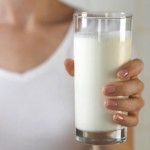To drink or not to drink… Milk
Categories: Vital Body
 I know these days deciding whether or not drink milk can be a difficult choice to make. We are surrounded by many positive and negative arguments. These can leave us confused, wondering whether to happily pick the white bottle or carton out of the fridge, promptly abandon the habit and find a replacement, or fluctuate between sometimes drinking milk and sometimes not. Is this familiar at all?
I know these days deciding whether or not drink milk can be a difficult choice to make. We are surrounded by many positive and negative arguments. These can leave us confused, wondering whether to happily pick the white bottle or carton out of the fridge, promptly abandon the habit and find a replacement, or fluctuate between sometimes drinking milk and sometimes not. Is this familiar at all?
For our organism to thrive, it is essential we make the right dietary choices for our individual needs, being well aware of the nutritional factors involved.
Ayurveda sheds some interesting light on the subject. This helps us understand milk better and explains that missing piece of the puzzle on why there are so many different experiences with this one dietary choice. So, what does Ayurveda say about drinking milk? Milk is considered to be like ambrosia, best amongst the vitalising and strengthening substances for our body and mind. A beautiful gift of nature offered by the loving cows, it has sweet, cooling and nourishing qualities that build up our body tissues, and promote intelligence, strength and immunity. In addition, it can be very useful in the treatment of diseases, including anaemia, acidity, fever, constipation and disorders of both the male and female reproductive systems. This is good news for milk lovers.
That said, there are certain conditions for consuming milk, which if ignored, can quickly turn it into an unhealthy drink and contribute to several ailments. To avoid this, Ayurveda advises we respect the following golden rules:
- Milk should always be boiled and drunk hot. This allows us to digest and absorb it more easily. If we drink it cold, milk is difficult to assimilate and can give rise to excess mucous, digestive and respiratory congestion, heaviness and tiredness.
- Milk should not be taken or mixed with ANY fruits, leafy vegetables, fish, salt or sour foods. Milk is incompatible with these items, which means that its goodness can’t be extracted if eaten in combination with them. Instead, it becomes an undigested build-up of material (known as “ama”) that releases toxins in our digestive system and can spread to other systems to trigger pathological responses. It’s those breakfasts with milk and oranges, or those meals accompanied with milk, that are best avoided and where you may wish to search for a milk substitute.
- Milk is heavy to digest, and therefore you need a good digestive fire to assimilate it. Milk is thus not be well-suited for people with a low metabolism, with digestive disorders, or with imbalanced kapha, who should improve their condition before they take it.
These days, we must also look at the source and quality of our milk. If it isn’t organic or unhomogenised milk, the chances are that its natural qualities have been altered.
Here are some local milk suppliers who offer good quality milk. Check them out if milk is right for you, and enjoy a hot cuppa before going to bed!
- Ivy Farm Dairy: organic, unhomogenised, Jersey milk. This is my favourite!
- Cow Nation: organic, unhomogenised milk
- Somerset Dairy: organic, unhomogenised milk
- Yeo Valley Farms: organic milk

Another supplier of organic, un-homogenised milk is Jess’s Ladies from Gloucestershire. They also opposed the badger cull which pleased me.
Great, thank you Esmee, this looks like a fine source of good quality milk. I’ll get some next time I’m in Gloucestershire.
A great article, my dear friend, stating the facts so clearly. I’ve never had any doubt as to whether milk is a good food or not, and have always experienced what feels like a psychological need for milk and milk products like butter and yoghurt. I cannot live without them. But what saddens me is the torture the mother cow is going through in this age. Because of this I buy very few milk products at mainstream outlets nowadays, and mostly only use the pure raw milk from the protected cow nearby to where I live. I am very grateful for this cow and to the people who care for her and milk her, and want to encourage cow protection and pure milk production everywhere. Thankyou again for the post.
Thanks for your feedback Bhadra. It saddens me too that these days cows aren’t treated fairly and their exploitation has become norm. I find it mirrors the exploitation of mother Nature that is currently taking place at large. I’m also grateful that here in the UK we can source milk from free grazing cows, which is rare in other countries.
When properly consumed, Milk and its derivatives constitute a key source of nourishment not only for the body but also for the mind. Raising the awareness of our symbiotic relationship with mother nature and mother cow may perhaps encourage farmers to develop better management system for them.